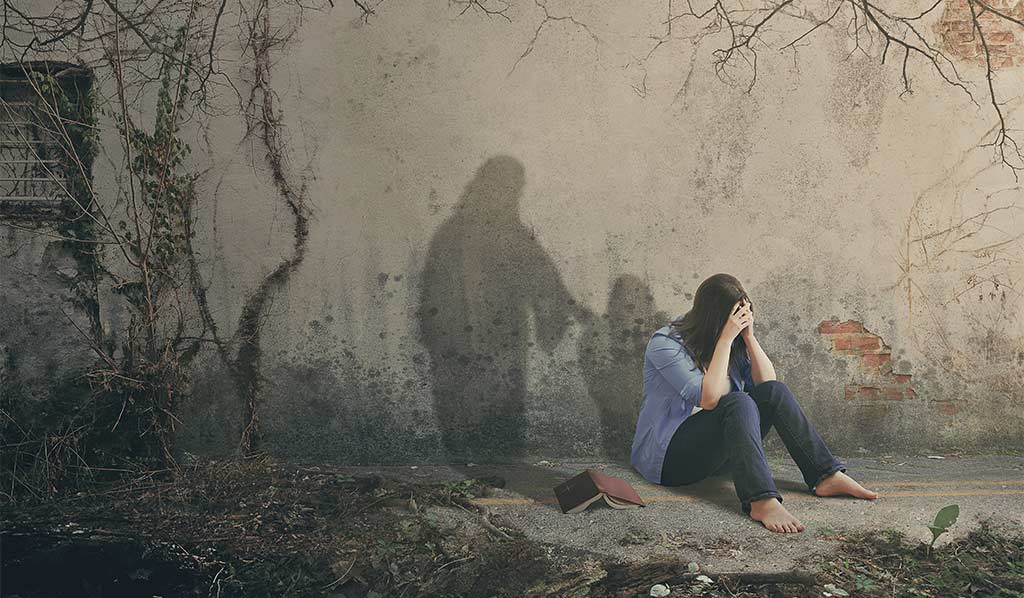Christian Loneliness: Why People Of Faith Often Feel Lonely

Loneliness is incredibly common among the general population, especially among millennials — yet it is rarely discussed in many religious circles.
- Christians may encounter loneliness when they feel their beliefs are misconstrued or misunderstood or when they think no one else shares them.
- The declining population of Christians can make it hard to find other like-minded people, especially if you’re from a younger generation.
- Spending time with people who aren’t religious — or those belonging to other religions — can help you define and expand your worldview.
Struggling with loneliness or having a mental health crisis?
- Suicide Prevention Lifeline: 1-800-273-TALK (8255); Deaf or hard of hearing dial 711 before the number or connect via online chat
I attended weekly church services throughout my childhood, studying the Bible and learning about what it means to be a “good Christian.”
When I headed off to college as a young adult, however, I quickly realized that I had been taught only one particular version of Christianity.
Many of my new friends grew up among other denominations that held different beliefs, and some of them weren’t religious at all.
Listening as my Christian friends discussed purity or debated whether queer people have a place in the church, I found their rhetoric familiar — but it made me uncomfortable.
I recognized that some of my beliefs had been inherited rather than chosen.
From that point onward, I made a conscious decision to examine what it was that I believed — without being influenced by others.
Over time, my beliefs began to shift in direction.
As my thoughts and opinions changed, however, I no longer fit in the spaces that were once so familiar.
I didn’t know where I actually belonged — and I suddenly felt very alone.
Why Are There So Many Lonely Christians?

Christian loneliness refers to feelings of isolation that people from all denominations of Christianity may experience as a result of their specific spiritual or religious beliefs.
When it comes to Christianity in particular, there are a few reasons why its adherents often feel lonely:
- Church attendance is on the decline, leaving Christians with fewer connections and an opportunity to meet kindred spirits
- The expression of “negative” feelings is often discouraged, which can lead to increased feelings of isolation
- Individuals who change their beliefs or leave a religion are sometimes ostracized by family or friends who remain indoctrinated
In America, fewer people are identifying with organized religion, including Christianity.
There are many reasons why younger generations are leaving the church — some people don’t find religion to be a source of comfort or peace, others want to leave a system that has caused hurt, and some no longer believe what they once did.
As a result of this exodus, I’ve often found it difficult to find other attendees who are my age.
Although I appreciate the opportunity to learn from my elders, I genuinely miss having peer connections at church.
Some Christians, as well as other religious people, feel that displaying loneliness or sharing other “negative” feelings is a sign of weakness — or weak faith.
After all, if faith alone is supposed to sustain you, a person shouldn’t need anyone else’s company, validation, or support, according to some interpretations of Scripture.
This can cause religious people to suppress their true feelings from themselves, and others.
When so many people hide their doubts, sadness, questions, or loneliness, other religious followers are left feeling like they’re the only ones going through the experience — deepening their sense of isolation.
Religious loneliness doesn’t just occur inside of churches, however, nor is it exclusive to Christianity.
When individuals within a family have differing spiritual or religious beliefs, its members may begin to feel disconnected from one another.
I’ve seen this cause major rifts between people and it has been heartbreaking to witness friends suffering through abandonment by their family over religious differences.
Though I’ve never left Christianity, my relationship with it has become more complex.
Spiritually, I am confident in my beliefs, who I am, and how I can best make “Earth as it is in Heaven.”
However, when it comes to the institution of Christianity — particularly certain traditions and long-standing beliefs that can be oppressive or hurtful — I sometimes feel a sense of spiritual loneliness and frustration.
For the most part, I can understand and respect religious traditions, even if I disagree with some of them.
Still, I tend to feel very alone whenever I hear people defending beliefs that are actively harming people. I refuse to believe that something is inherently “right” just because it is a tradition.
Exploring my thoughts, feelings, and beliefs about my spirituality and my religion isn’t something I regret.
However, I am often left asking myself: What am I supposed to do when I feel alone among other believers?
Christians often feel lonely when they feel as if they are alone in their thoughts and beliefs.
In addition, Christians whose beliefs change, or who openly express feelings of loneliness, may be inadvertently ostracized by their Christian peers.
How Can Christians Feel Less Alone Inside And Outside Of Their Communities?

If you feel lonely within your religious community or while spending time with those who don’t share your beliefs, there are a few things that have helped me to alleviate my Christian loneliness.
- Spend time with people that have differing beliefs, and lead with kindness and curiosity.
Although it can be intimidating at first, it’s a good idea to engage with people of other religions — or those that have no religion at all.
Despite the decreasing population in churches as a whole, a 2014 study found that over 50% of people classify religion as a “very important” aspect of their lives.
Learning about someone else’s religion is a great way to connect with them.
Sharing your innermost thoughts about spirituality can be a vulnerable experience, which is why it’s important to listen intently and speak respectfully if the topic comes up.
Whenever someone has shared their beliefs with me in the past, it felt like they were showing me a part of themselves.
These types of discussions almost always made me feel closer to my friends, regardless of how similar or different their beliefs were to mine.
Conversations about spirituality or religion have helped me to connect deeply with others, and these connections have helped me to feel so much less alone in the world.
- Allow yourself to question and change your beliefs — and to feel genuine emotions.
It’s sometimes hard to question your spiritual beliefs or to allow yourself to feel things that are painful or contradictory to what you were taught, but ignoring your feelings isn’t actually useful.
While some religious leaders may encourage Christians to remain stoic and to refrain from displaying any “negative” emotions, Scripture shows Jesus expressing his anger and frustration at injustices in the world.
I worked out my own beliefs by talking to friends and family, reading Scripture, and researching the origin of particular words or systems of beliefs.
I assessed my own moral compass while looking at the world around me.
As someone who feels things deeply, I found it helpful to express my frustration over the Bible being used to justify inequality or to explain to others why certain traditions or practices made me feel lonely.
Once I had parsed my own beliefs, I was able to take action to better the world around me.
There’s no reason to rush to define your feelings or beliefs, however.
They don’t have to be set in stone, either. As you experience new things in life, your worldview will likely expand — and that’s not a bad thing.
Likewise, acknowledging your questions or loneliness doesn’t mean you’re not faithful — it only means you’re human.
- Seek a community to ease feelings of loneliness and isolation.
Social connections are incredibly important for your well-being.
Locating a community of people and kindred spirits who share similar beliefs can be incredibly validating, especially for people of color, women, queer people, and other groups who may have faced oppression within Christian communities.
I’ve found that everyone has nuanced beliefs that are a bit different from my own. There are numerous denominations of Christianity, in part because there are so many interpretations of what the Bible really means.
Though it’s helpful to know what you’re looking for before beginning your search, you shouldn’t let your uncertainty stop you from reaching out.
It can take time but finding a community that wholly accepts and loves you is worth the endeavor.
In my experience, the best is one that allows you to freely express your beliefs without judgment — even if your thoughts don’t perfectly align with those of others in the group.
For lonely Christians, there are several ways to manage your loneliness.
Allowing yourself to question the origin of your beliefs and permitting yourself to feel things can be a relief for some Christians, too.
Finally, finding a community of like-minded people can also help you to feel less alone.
Closing Thoughts
Though it’s hard for some people to acknowledge, religious people often feel lonely — and that’s okay because loneliness is part of being human.
Everyone’s path through spiritual loneliness will be different.
What I know for certain, however, is that pretending you’re not lonely won’t suddenly make you feel any happier or less isolated.
Editor’s Note: This article is part of The Roots Of Loneliness Project, the first-of-its-kind resource that comprehensively explores the phenomenon of loneliness and over 100 types we might experience during our lives.
Find Help Now
If you’re struggling with loneliness in Christianity, we’ve put together resources to meet you wherever you are — whether you want someone to talk to right now, or are looking for longer-term ways to help ease your loneliness.
- Suicide Prevention Lifeline: 1-800-273-TALK (8255); Deaf or hard of hearing dial 711 before the number or connect via online chat
- Resources & Emotional Support For Loneliness
- Volunteer & Pet Adoption Opportunities






